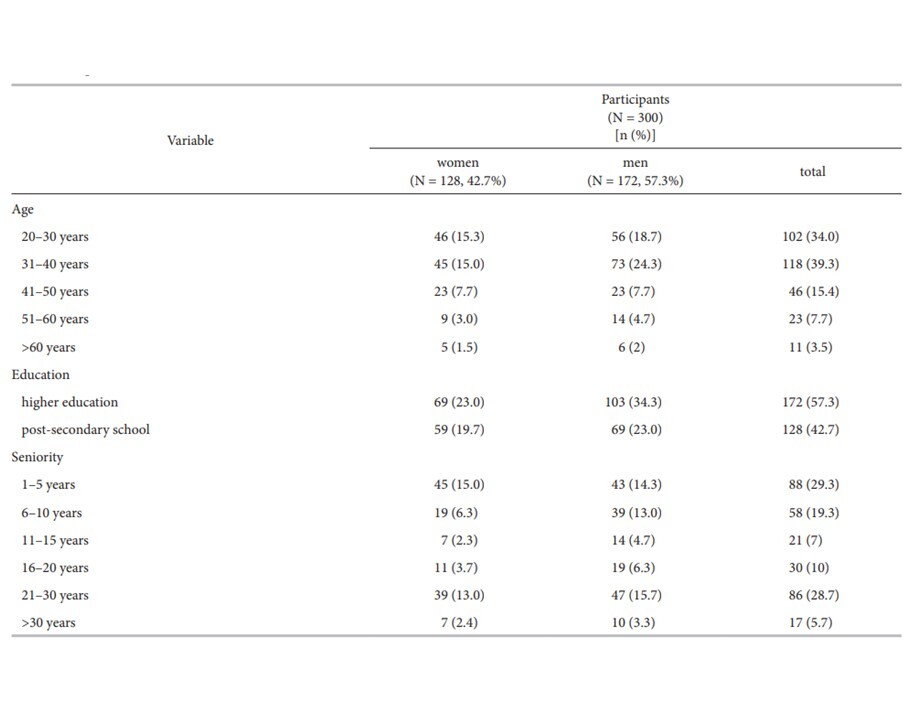Online first
Bieżący numer
Archiwum
Najczęściej cytowane 2024
O czasopiśmie
Zespół Redakcyjny
Komitet Redakcyjny
Polityka prawno-archiwizacyjna
Kup czasopismo
Klauzula informacyjna o przetwarzaniu danych osobowych
Deklaracja dostępności
Instrukcje dla Autorów
Instrukcje dla Recenzentów
Polecamy
Kontakt
Recenzenci
2024
2023
2022
2021
2020
2019
2018
2017
2016
2015
2014
2013
Redakcja i tłumaczenia
PRACA ORYGINALNA
The COVID-19 pandemic as a stress factor in the work of a paramedic
1
Medical University of Silesia, Katowice, Poland (Faculty of Health Sciences in Bytom, Department of Environmental Health)
2
Medical University of Silesia, Katowice, Poland (Faculty of Health Sciences in Bytom)
Data publikacji online: 23-01-2023
Autor do korespondencji
Anna Spychała
Medical University of Silesia, Faculty of Health Sciences in Bytom, Department of Environmental Health, Piekarska 18, 41-902 Bytom, Poland
Medical University of Silesia, Faculty of Health Sciences in Bytom, Department of Environmental Health, Piekarska 18, 41-902 Bytom, Poland
Med Pr Work Health Saf. 2023;74(1):9-17
SŁOWA KLUCZOWE
DZIEDZINY
STRESZCZENIE
Background: A paramedic is a person providing health services in a state of sudden threat to life or health. This profession is one of the most difficult and responsible, and the appearance of SARS-CoV-2 has made working in the healthcare system an incredible challenge. The aim of the study was to analyze the impact of the SARS-CoV-2 pandemic on the psychological condition of paramedics. Material and Methods: The research material was a database developed from a questionnaire administered to 300 active paramedics. Respondents answered questions about their subjective feelings and questions related to their experiences as paramedics during the COVID-19 pandemic. Results: More than half of the respondents were infected with the SARS-CoV-2 and the majority contracted it at work. The survey showed that 11% of the respondents felt very high stress, 38.4% high and 32% moderate. Research has shown that very high, high and moderate levels of stress were experienced more often by paramedics in the 31–40 age group, and little or no stress in the 20–30 age group and paramedics with the longest professional experience less frequently declared experiencing stress at a very high or high level and less frequently experienced burnout in relation to paramedics working in the profession of 1–5 or 6–10 years. Conclusions: The results of a study showed that performing professional duties during the SARS-CoV-2 pandemic may have influenced paramedics’ perceptions of their psychological condition, including subjective feelings of stress levels, social exclusion, or burnout. Med Pr. 2023;74(1):9–17
Udostępnij
ARTYKUŁ POWIĄZANY
Przetwarzamy dane osobowe zbierane podczas odwiedzania serwisu. Realizacja funkcji pozyskiwania informacji o użytkownikach i ich zachowaniu odbywa się poprzez dobrowolnie wprowadzone w formularzach informacje oraz zapisywanie w urządzeniach końcowych plików cookies (tzw. ciasteczka). Dane, w tym pliki cookies, wykorzystywane są w celu realizacji usług, zapewnienia wygodnego korzystania ze strony oraz w celu monitorowania ruchu zgodnie z Polityką prywatności. Dane są także zbierane i przetwarzane przez narzędzie Google Analytics (więcej).
Możesz zmienić ustawienia cookies w swojej przeglądarce. Ograniczenie stosowania plików cookies w konfiguracji przeglądarki może wpłynąć na niektóre funkcjonalności dostępne na stronie.
Możesz zmienić ustawienia cookies w swojej przeglądarce. Ograniczenie stosowania plików cookies w konfiguracji przeglądarki może wpłynąć na niektóre funkcjonalności dostępne na stronie.






